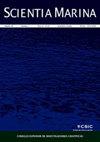Assessing changes in size at maturity for the European hake (Merluccius merluccius) in Atlantic Iberian waters
IF 0.9
4区 生物学
Q4 MARINE & FRESHWATER BIOLOGY
引用次数: 1
Abstract
European hake (Merluccius merluccius) is a commercially important resource in Iberian Atlantic waters. Despite the recovery plan implemented in 2006 and the multiannual management plan for western waters, fishing mortality is still higher than that corresponding to the maximum sustainable yield for the southern European hake stock. The biological processes underlying the dynamics of this stock and its life history traits are essential for assessing population productivity and resilience, making them basic information for management. We analysed the temporal variability of size at maturity (L50) of this species and the main factors influencing it in Atlantic Iberian waters from 1982 to 2019. The annual variability of L50 for each sex was modelled with generalized additive models, considering explanatory environmental variables (Atlantic Multidecadal Oscillation, North Atlantic Oscillation and sea surface temperature) and biological variables (biomass, spawning biomass at length and relative condition factor). The results showed that the L50 of males decreased by a total of 12.9 cm and L50 of females decreased by a total of 10.9 cm from 1982 to 2019. For females the significant explanatory variables were year, spawning biomass at length, biomass and the North Atlantic Oscillation, while for males only year was an explanatory variable. These results are important for understanding the status of the European hake population, signalling that L50 is a good indicator for predicting future population dynamics.评估大西洋伊比利亚水域欧洲鳕鱼(Merluccius Merluccius)成熟时大小的变化
欧洲鳕鱼(Merluccius Merluccius)是伊比利亚大西洋水域的重要商业资源。尽管2006年实施了恢复计划和西部水域的多年管理计划,但捕捞死亡率仍然高于南欧鳕鱼种群的最大可持续产量。这种种群动态的生物过程及其生活史特征对于评估种群生产力和恢复力至关重要,使其成为管理的基本信息。分析了1982 - 2019年大西洋伊比利亚海域该物种成熟期大小(L50)的时间变异性及其主要影响因素。考虑环境变量(大西洋多年代际涛动、北大西洋涛动和海面温度)和生物变量(生物量、产卵长度生物量和相对条件因子),采用广义加性模型模拟了各性别L50的年变率。结果表明:1982 - 2019年,雄性的L50下降了12.9 cm,雌性的L50下降了10.9 cm;雌鱼的显著解释变量为年份、产卵长度生物量、生物量和北大西洋涛动,雄鱼的显著解释变量为年份。这些结果对于了解欧洲鳕鱼种群的状况很重要,表明L50是预测未来种群动态的一个很好的指标。
本文章由计算机程序翻译,如有差异,请以英文原文为准。
求助全文
约1分钟内获得全文
求助全文
来源期刊

Scientia Marina
生物-海洋与淡水生物学
CiteScore
2.10
自引率
0.00%
发文量
21
审稿时长
6-12 weeks
期刊介绍:
Scientia Marina is the successor to Investigación Pesquera, a journal of marine sciences published since 1955 by the Institut de Ciències del Mar de Barcelona (CSIC). Scientia Marina is included in the Science Citation Index since 1998 and publishes original papers, reviews and comments concerning research in the following fields: Marine Biology and Ecology, Fisheries and Fisheries Ecology, Systematics, Faunistics and Marine Biogeography, Physical Oceanography, Chemical Oceanography, and Marine Geology. Emphasis is placed on articles of an interdisciplinary nature and of general interest.
 求助内容:
求助内容: 应助结果提醒方式:
应助结果提醒方式:


